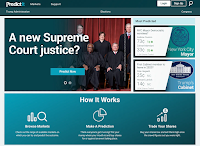Though he initially made a name for himself betting on politics through PredictIt a decade ago, Davies — who has been featured in the Washington Post, Politico, and Bloomberg — has branched out from politics and made thousands of dollars gambling on music and movies in recent years. We hopped on the phone last week to talk about how he chooses what to bet on, why Rotten Tomatoes is more complicated than Spotify, and if all this gambling is good for society.
Nope. I work in IT. I do make more money betting than I do working, but I still work.
How long have you been active in betting markets?
I started in 2015 with some political bets.
Were you always interested in gambling or did you just think you had knowledge that you could make some money with?
The latter. I was pretty interested in politics for a long time. I’d be on forums where I could discuss it for a long time. Then I saw ads for this thing called PredictIt ,and I thought I’d give it a try. Before that, my only experience gambling was some poker when that was super popular in the 2000s.
Over the last few years, so many betting markets have gone mainstream, the two biggest probably being Polymarket and Kalshi. What have been the biggest changes in this space since you got started a decade ago?
The biggest change is that it’s gone from something you can make a little bit of money with to something you can make a living with. When I started on PredictIt, you could only bet $850 at a time. Because of that, you probably couldn’t make six figures. With Kalshi and Polymarket, you can easily drop $100k in a market.
Though your initial interest was politics, you seem to be quite active in cultural markets these days, meaning music and movies. How did you get involved in those?
Same type of thing. I love music. I love movies. When those markets appeared, it gave me an outlet to make money on things that I love.
Recently, I saw you betting on what would be the top song on Spotify on a given day. Can you give me some insight into how you assess a market and size your bets?
There are several music markets on Kalshi. Originally, they were all connected to Billboard. The way Billboard constructs their charts is kind of opaque unless you want to pay a bunch of money for their data. Spotify markets caught my eye because all of their data is public. It’s completely transparent. Because of that, I can analyze the data and identify trends. It’s like 95% math and 5% your gut.
So, you are building statistical models to find an edge?
Yup. Most days I’m analyzing decay rates of the most popular songs and growth rates of viral ones. I then compare those to historical trends. I also look at proxies for performance. None of them are perfect, but Apple Music and iTunes will also give you some insight into how something is doing on Spotify.
Do you manually place bets or are they handled automatically through an API?
I’m 100% manual. I’ll monitor markets throughout the day and just look for a price that I want. I will use limit orders, so I don’t have to watch things continuously, though. But I’m still the guy pressing buttons to execute trades.
You’re also very active in betting on what score a movie will get on Rotten Tomatoes. Is your process there similar?
It’s similar, but the complexity around Rotten Tomatoes is far greater. Spotify is really just a single data drop every day and then monitoring some proxies. Rotten Tomatoes involves more modeling ahead of time. I have to track when new reviews drop and gauge how they will affect things. It’s just more complicated.
Are those the most complex markets you bet on?
I think so.
It’s clear to me that markets provide utility in some cases. For example, some people claim that betting markets on inflation are more accurate than experts. It’s valuable to have accurate inflation forecasts. But the utility of other markets is not clear to me. Like is there any value by having markets to bet on how songs will chart? Or is it just a way to make money?
I think you’ll hear many defenders of prediction markets claim that they are great sources of information. In many cases, they are. But there are also tons of examples where the information from the market provides little to no value. Like does it matter if “Luther” by Kendrick Lamar is going to top Spotify’s daily chart on April 14, 2025? No. It’s not elections or economics data. It’s just a way to gamble. Nothing more.
Over the last few years, gambling markets — especially those around sports — have become very accessible. Everyone is carrying a casino in their pocket. Though I think that people should be able to gamble if they want to, do you think there are downsides to how prevalent gambling has become?
Absolutely. I don't try to fool myself. I've done very well on this stuff, but I don't think the majority of people can control their betting very well. They often lose more than they should be losing. It’s a fairly large problem, and I think it's getting worse with the prevalence of sports betting. It's all over the place. It's so easy for a fun hobby to become a bigger problem. I think it's definitely a societal problem, even though I benefit greatly from it.
by Chris Dalla Riva, Can't Get Much Higher | Read more:
Image: PredictIt